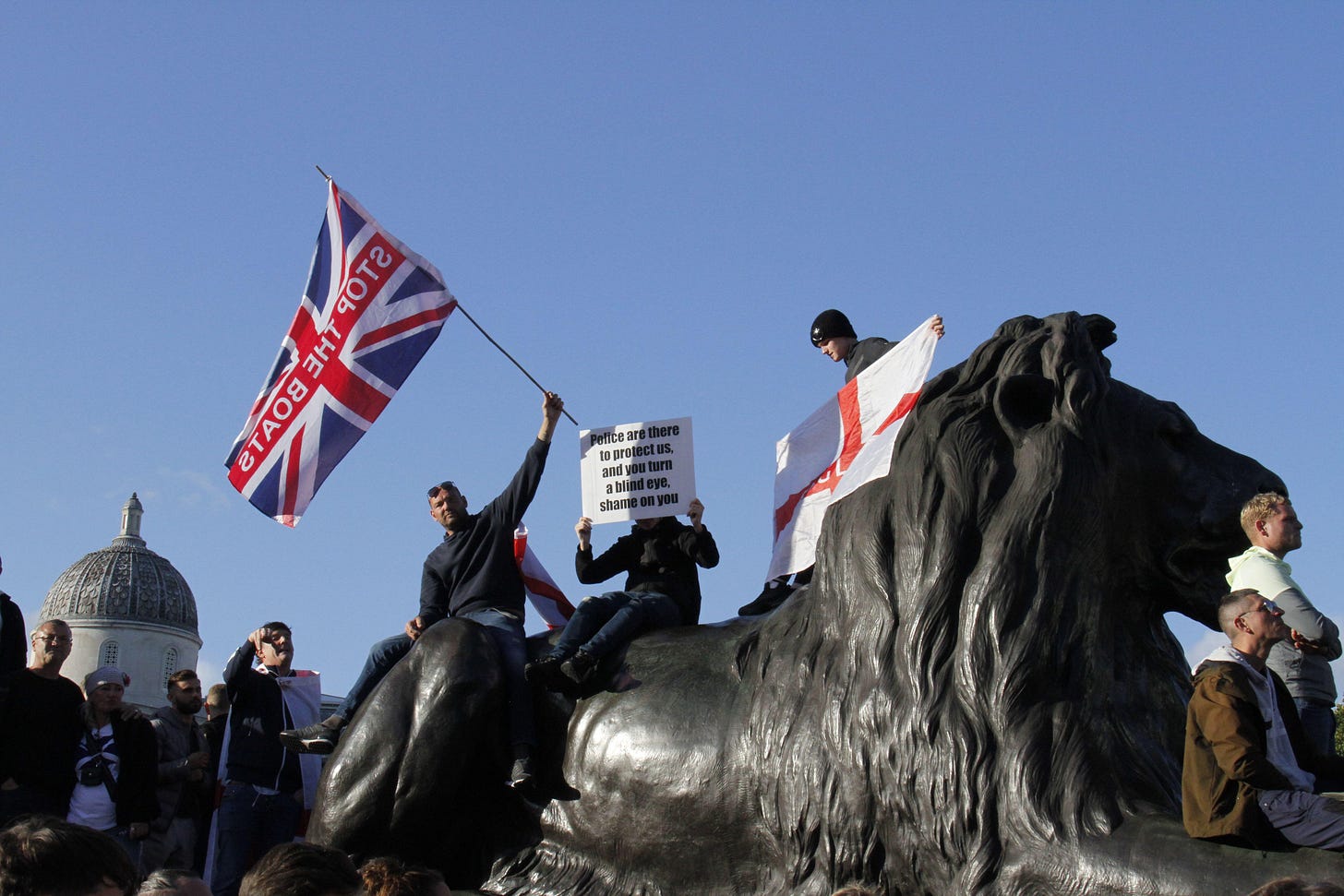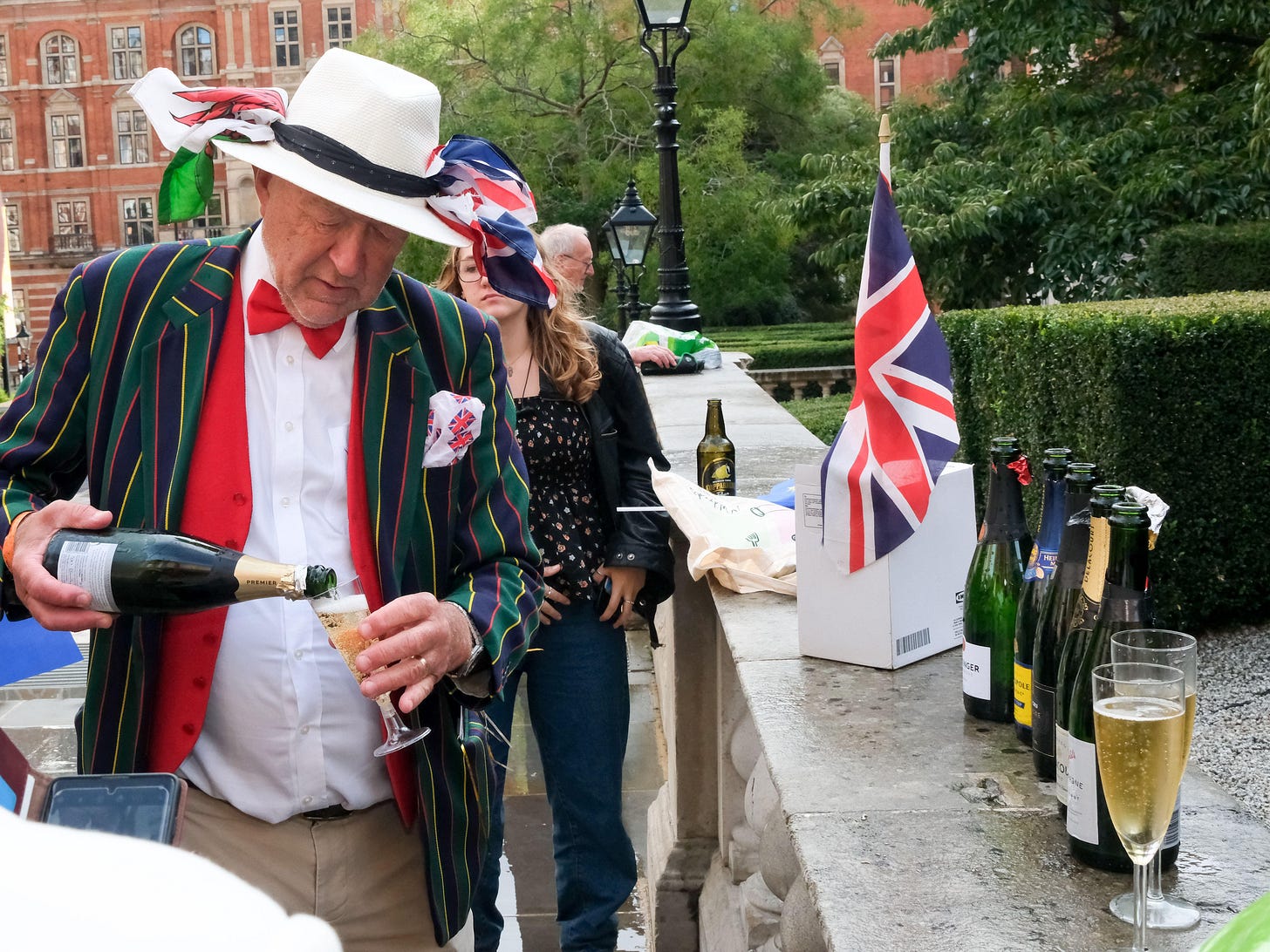Signs of the Time
By speaking solely of immigration, politicians and the media mask the underlying conditions that have created a country alienated from itself, argues Editor-in-Chief of Byline Times, Hardeep Matharu

Hardeep Matharu is shortlisted for the Editors’ Editor 2025 Award by the British Society of Magazine Editors.
I became a journalist because I am curious about the forces that shape us.
The artist Paul Klee once said that art does not represent what we see, but makes us see. And I quickly learned the same is true of journalism: far from being a neutral arbiter of information, it has the same power to craft the ideas we think with, not just the ideas we think about.
I see this being affirmed, once again, as the media and adjacent political class create the conditions for a potentially stark future for the UK – even with an election still four years away.
It is not simply that it is easy to forget that a Labour Government was elected just last July with a considerable majority. Or the endless headlines on Nigel Farage’s Reform UK – much of the coverage framed around the prospect of a man whose party has five MPs becoming the next Prime Minister.
It is that the temperature of the water we swim in is heating up, and has been for years, but is now getting obviously hotter, in different ways, all around us – without us hearing anything meaningful about this.
A friend I have known since I was a teenager recently told of their concerns that the suburb in which they live is full of St George’s and Union flags. “I know it sounds stupid, but this is the first time in my life that I’m now thinking of myself in terms of my race.” A person of colour, they are concerned about what a turn to the hard-right for the UK might mean for their everyday lives and that of their children. They asked me what it would look like. I didn’t have any answers, but said we can witness events in the US as evidence of what happens to a society when the frames of what is permissible to say and do are widened to the extremes.
In Liverpool for this year’s Labour Party Conference, a few weeks earlier, a similar sentiment was shared by someone living close to the Bell Hotel in Epping, the location of protests against its housing of asylum seekers. They said security guards now positioned outside the building marked out that there were ‘others’ inside, and that they would see children who live in the hotel playing outside – behind the fencing erected around the hotel. A disturbing scene, in their view. The individual, whose children are of mixed heritage, said they drove them to and from school every day now.
In line for dinner in the city centre, an older couple shared how they would not be voting for Reform but believed it had a good approach on immigration. While Liverpool had always been multicultural, the man said, what had happened in the past few years was not right. He referenced an apparent increase in black babies in prams in the streets – “white people don’t have big families like the Africans do” – and was shocked when he asked me my name. “Oh, have I said racist things in front of you?” he responded – before mentioning that Chinese and Indian immigrants were his ‘favourites’ because of their work ethic and contributions to British society over many years.
The complexity of this increasingly fragmented political culture had been on my mind all summer.
On the evening of 13 September – the same day as the ‘Unite the Kingdom’ protest rally organised by far-right convicted activist Stephen Yaxley-Lennon (‘Tommy Robinson’) in central London – I was generously afforded a media ticket to the Last Night of the Proms. I’d seen it broadcast on TV for years and jumped at the chance to stand beside the stage with the Promenaders. Aside from the stellar music, I thought it would provide some interesting insights.
While the atmosphere inside the Royal Albert Hall was friendly and pleasant, I also found it alienating.
A simple bite to eat set me back £40 in one of the restaurants. Speaking to a man who had travelled from Oxford, he agreed with me that our part of the audience was not diverse in any way – particularly in terms of race or class. He was surprised to find that I was Indian (he, like the Liverpudlian man, assumed I was a white woman from my appearance) and told me about his wife, who also had Indian heritage. I noticed two small badges on his shirt placed next to each other – one of the St George’s flag and another of the Union flag. He said he had only put them on once he had reached the Royal Albert Hall and would be removing them again before the journey home on public transport – because he didn’t want anyone to see them and come to their own interpretations about why he was wearing them.

As we approached the end of the concert, the flag-waving ramped up. European Union flags, as well as those of other countries, alongside those of the UK, were vigorously waved and Rule, Britannia! belted out. It was joyous but also exclusive; removed. A ‘bubble’ of an evening.
Walking to the tube afterwards, I saw news reports of the violent scenes from the day’s protest rally. The gap, I felt, was ‘too big’: between those people on the streets and those in the Royal Albert Hall. Not just in terms of the obvious difference of their behaviour that day, but because of the truth that we are living in many different worlds in the UK which can’t seem to find a way to relate to, or understand, each other.
And instead of fostering more cohesion, or offering a new vision, our journalists and politicians can speak only of immigration – that is the extent of our ‘national conversation’. Presented as the ultimate explanation for this fragmentation, it merely masks all of the underlying conditions that have created an unequal country alienated from itself.
This is why I found Keir Starmer’s warning that the UK risks becoming an “island of strangers” such a seminal political moment this year – because it was the right conclusion to draw for the wrong reason. Immigration is seized upon because the media-political class knows it gives some voice to the grievance and justified disconnection people feel. But the real reasons for this are not excavated, more honestly or profoundly.
Even on basic factual inquiry, British journalism shows shockingly little curiosity in digging deeper.
When Green Party Leader Zack Polanski challenged Reform’s Zia Yusuf on BBC’s Question Time about the closeness of the relationship between his Leader, Nigel Farage, and the former Reform Leader in Wales, Nathan Gill – who has admitted taking bribes to further Russian interests – the exchange was cut short by Fiona Bruce. Quickly intervening, she said: “I think there are other things that the audience want to talk about, am I right?” When a vague ‘yes’ followed, she carried on. “Where are we with time?”
On the verge of a profound schism I fear, unless we find some common reality again which does not require us to discount the experience of others. ✺



They talk about immigration, or more particularly, about small boats, because they are the latest scapegoats for the dire state of the UK. Never do the media or politicians do any critical thinking and ask why are people coming in small boats and why are people blaming “illegal migrants” for many of the nation’s ills. The first is obvious as is the solution: no safe and legal routes. The second is perhaps not so obvious, but is partly, or maybe largely, due to the failure of governments since the late 70’s to care for all citizens.
Neoliberal ideas had been around, under the radar, for several decades until the 70’s oil shock gave its proponents their chance and their delivery vehicle in the UK was Thatcher and her government. Everything she and subsequent PM’s did was in the interests of a small minority of rich people and companies. The vast majority had to wait for the “wealth creators” to allow riches to trickle down to the plebs below where a rising tide would lift all boats. Of course it didn’t but instead was salted away in secrecy jurisdictions.
Meanwhile, government had to become smaller, get out of the way, stop crowding out the dynamism of private enterprise. So State assets were sold off, public spending, aka investment, was curtailed, books had to be balanced, because government finances were exactly the same as household finances (despite the government having its own bank, unlike households) and the result is what we see today: underfunded public services such as the NHS, crumbling infrastructure, austerity, stagnating incomes for the majority, food banks, increased inequality and poverty, insecure employment (the flexible workforce) and a few obscenely wealthy individuals and company profits, paid for by consumers and aided by government subsidies going abroad to foreign owners.
When people are left feeling life isn’t going to get better for themselves or their children then some look towards the snake oil salesmen who can tell them who to blame -immigrants and foreigners- and sell them lies and false hope.
Government needs to escape the destructive neoliberal paradigm and start investing serious amounts of money in looking after the interests of the majority and curtailing the greed of the wealthy.
Congratulations on your excellent work and best wishes for the award.
One comment on the article: elected with a majority is not the same as elected by a majority. The former creates a false sense of popular support for the government while in reality the majority of the electorate is not on board, by definition. A government which governs oblivious to that reality will find strong headwinds in its way. “ The people you leave behind slow you down, the people you cast aside draw you down”. Unknown proverb, at least to me.